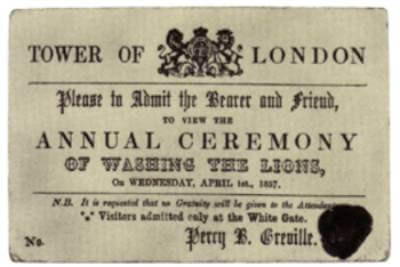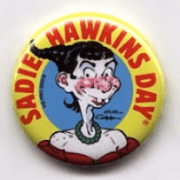April 1 is April Fools’ Day
Today is April Fools’ Day, also known as April Fool’s Day. When we set out to determine its origins, we found a lot more theories than answers.

Satellites around Mars hoax – 1959
The ancient Romans celebrated the aptly-named Hilaria festival in late March to honor the resurrection of Attis, son of the Great Mother Cybele. It was essentially a big costume party, copied from the Greek ΑΝΑΒΑΣΙΣ (Ascensus). Did they play practical jokes? We like to imagine the thrill of tying someone’s gladiator sandals together and asking him to go get us more punch.
Was Chaucer the first author to refer to April Fools’ Day when he wrote Nun’s Priest’s Tale in 1392? Probably not. Scholars disagree in their interpretation of the phrase “thritty days and two.” Some believe it is meant to be added at the end of March (May 3rd); others, to its beginning (April 1st). The latter would seem to link the date to his tale of a fool being tricked by a fox. Chaucer may have been intentionally vague and, as a master of satire, would almost certainly delight in the literary dustup he caused.
The first direct reference to April 1st as a day to play jokes was written by Flemish poet Eduard de Dene in 1561. It is titled “Refereyn vp verzendekens dach / Twelck den eersten April te zyne plach,” which translates very roughly to “Refrain on errand-day / which is the first of April.” In it, a nobleman decides to trick his servant by sending him on numerous silly and unnecessary errands. What a funny guy! The servant realizes what his boss is up to and in the closing line of each stanza, says, “I am afraid…that you are trying to make me run a fool’s errand.”

Flying bus hoax – 1950
Another story claims that April Fools’ Day originated in France. On a trip to survey his kingdom, Charles IX noticed that church districts began the new year on many different days, including Christmas and Easter. On August 9, 1564, not long after his 14th birthday, the king issued the Edict of Roussillon, which included the decree that January 1st would mark the new year for all. It was enacted on January 1, 1567.
Legend holds that some people clung stubbornly to the old New Year’s Day and they were mocked as “April fools.” Dealing with multiple calendars and moveable feast days, some timed to consolidate pagan and Christian holidays, must have been confusing. But there is no record of anyone in France ever celebrating New Year’s Day on April 1st.
In Great Britain, March 25th was celebrated as New Year’s Day because it coincided with the Feast of Annunciation. The Christian observance lasted seven days, ending on April 1st. But the April Fool’s calendar-change theory doesn’t work there, either, since the country as a whole clung stubbornly to its tradition until 1752. By then, April Fools’ Day had already become a time-honored tradition.
As it turns out, Great Britain had been in on the joke for quite a while. On April 2, 1698, Dawks’s News-Letter reported, “Yesterday being the first of April, several persons were sent to the Tower Ditch to see the Lions washed.” Tickets were issued for admittance to the Annual Ceremony of Washing the Lions. Visitors were informed they must go to the White Gate to gain entrance.

Ticket hoax – 1857
There was no White Gate. There were no lions. But the ticket allowed the bearer to bring one friend. True humiliation only takes place when someone you know is there to see it.
To sum up, we still don’t know who created this holiday. We suspect the first prank happened in a cave when one guy stuck another guy’s hand in a puddle while he was sleeping to see if he could get him to wet his loincloth.
Have a happy April Fools’ Day!
![]()
© 2022, Worldwide Weird Holidays. All rights reserved.







 2022
2022
Leave a Reply
Want to join the discussion?Feel free to contribute!